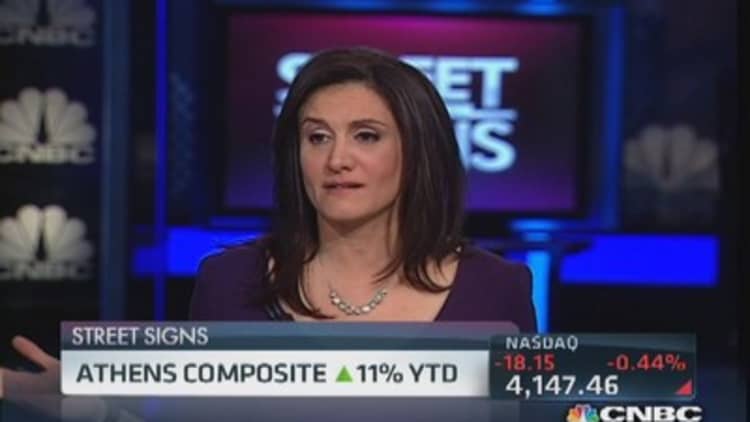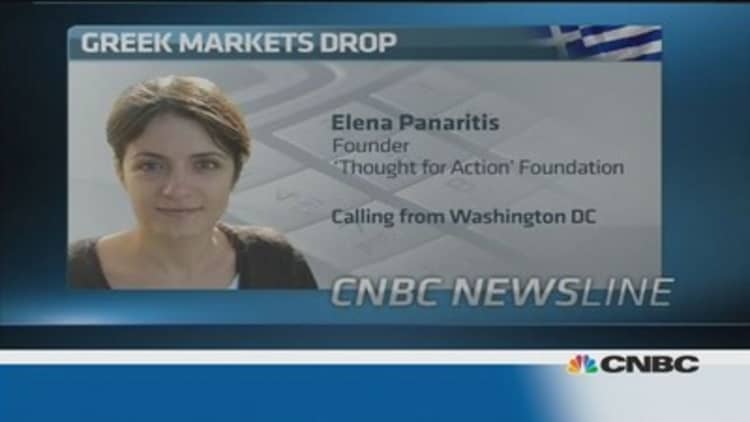Greek banks have been the darlings of bottom-fishing hedge funds, but alarm bells are starting to ring due to the banks' mounting bad loans, dependence on euro-system funding and looming scandals. While the risk of a Greek exit from the euro has declined, their shine as risky bets is waning.
(Read more: Paulson leads charge into Greek banks)
After a spiraling six year recession turning into a deflationary depression, the bursting of a property bubble, unprecedented depositor outflows and a 200 billion euro ($273 billion) sovereign debt restructuring, Greek banks would have imploded without aid, but their survival is already factored in to their valuations.
Now let's do a reality check on the health of the four systemic banks. Greece's top systemic institutions are National Bank, Piraeus Bank, Eurobank and Alpha Bank, which control about 90 percent of the country's banking market.
They are dependent on euro-system financing to the tune of 73 billion euros, due to an exit of deposits. This stems from the crisis and the worrying depositor haircut in Cyprus, which could be a template for Athens, and so drove savers to seek stability overseas.
Additionally, the outlook on bad loans is calamitous, with some predicting that non-performing loans will reach 40 percent at the end of the year, or 85 billion euros. Bad loans are not expected to decelerate until the end of the first quarter of 2015.
(Read more: Greece's Piraeus Bank warns of rising bad loans)
The banks are currently playing an "extend and pretend" game to avoid tearing a multi billion-euro hole in their balance sheets.
Thankfully for the banks, the Greek Parliament has suspended most home repossessions for another year, keeping their overdue property loans in suspended animation. it has also kept some 200,000 families off the streets.
Regulators, the banks, the government and the country's international creditors are all grappling with how to begin restructuring the country's mountain of bad debt. Even the low-key central bank governor, George Provopoulos, has recently weighed in to encourage higher provisions and write-offs, and to advocate a new focus on local banking.
Provopoulos said that credit losses on bad underwriting should be taken and left in the past, and that Greek banks should focus on extending credit to dynamic, outward-looking businesses.

The long-awaited report on Greek banks' capital adequacy, commissioned from Blackrock by the Greek central bank, has been delayed for months.
In the worst case, the report may say banks need another 5-8 billion euros in capital, on top of the 28 billion they received last summer. While the funds exist as part of Greece's international bailout package, the government was hoping to use the funds to help close its gaping fiscal deficit.
(Read more: Future bailouts? Do it yourself, says Bundesbank)
Re-privatizations
In terms of bank re-privatizations, a proposed law that would have sped up the re-privatization on local banks is suffering delay-after-delay. the final exercise dates on bank warrants accrue in late 2017 for Alpha and National Bank, and in January 2018 for Piraeus. The law may prove hard to pass for political reasons, and no one will consider it before the capital needs of systemic banks are pinned down.

Recently a scandal has broken out at Hellenic Post Bank (now owned by Eurobank) that re-shifted the focus onto bank relationships with big media, big business and interference by political parties.
The arrests and investigations have delayed Eurobank's 2 billion euro capital raising by at least a quarter, and should these inquiries be extended and intensified, the whole sector could be rocked.
To date, hedge fund managers have been attracted to the high leverage offered by Greek bank warrants and their supposedly high rewards when compared to risks. But they are likely to be more conservative in assessing the rising risks of the sector as they look to rebalance their portfolio allocations.
(Read more: Emerging market fears hit EM-newcomer Greece)
Greece was stripped of its developed market status due to its sky-high debt pile, and has been re-classified as an "emerging market". Now that international funds are favoring an unwinding of emerging markets positions, it may be time to tread more carefully in Greek bank warrants and shares.
Greek banks offered the most geared equity investments in the "Gre-covery", but now it is time to slow the bottom-fishing boat, because many risky downside rocks are on the horizon.
Nick Skrekas is a leading Greek economic analyst in Athens and has experience as a legal practitioner, author and seminar leader.

